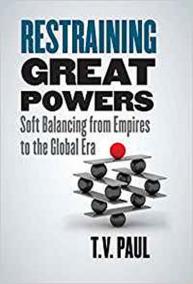Restraining Great Powers: Soft Balancing from Empires to the Global Era
Dátum vydania: 02.11.2018
How subtler forms of balance-of-power politics can help states achieve their goals against aggressive powers without wars or arms races
At the end of the Cold War, the United States emerged as the world's most powerful state, and then used that power to initiate wars against smaller countries in the Middle East and South Asia. According to balance-of-power ...
Detaily o knihe
Počet strán: 256
Rozmer: 165x242x22 mm
Hmotnosť: 520 g
Jazyk: Anglicky
EAN: 9780300228489
Rok vydania: 2018
Žáner: Angličtina ( tituly v Anglickom jazyku)
Typ: Knihy viazané
Zákazníci, ktorí si kúpili túto knihu, si kúpili aj...
O knihe
How subtler forms of balance-of-power politics can help states achieve their goals against aggressive powers without wars or arms races
At the end of the Cold War, the United States emerged as the world's most powerful state, and then used that power to initiate wars against smaller countries in the Middle East and South Asia. According to balance-of-power theory-the bedrock of realism in international relations-other states should have joined together militarily to counterbalance the U.S.'s rising power. Yet they did not. Nor have they united to oppose Chinese aggression in the South China Sea or Russian offensives along its Western border.
This does not mean balance-of-power politics is dead, argues renowned international relations scholar T.V. Paul, but that it has taken a different form. Rather than employ familiar strategies such as active military alliances and arms buildups, leading powers have engaged in -soft balancing,- which seeks to restrain threatening powers through the use of international institutions, informal alignments, and economic sanctions. Paul places the evolution of balancing behavior in historical perspective from the post-Napoleonic era to today's globalized world.












